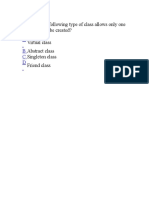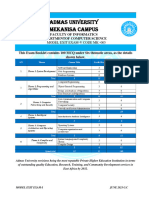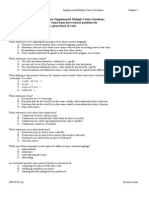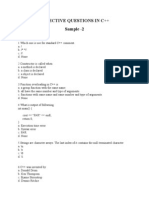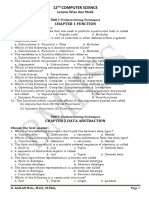Composition: A. B. C. D
Uploaded by
lakhdive3937Composition: A. B. C. D
Uploaded by
lakhdive3937Which of the following concepts provides facility of using object of one class inside another class?
A. Encapsulation B. Abstraction
C. Composition D. Inheritance
How many types of polymorphisms are supported by C++?
A. 1 B. 2
C. 3 D. 4
The two main types of polymorphism are run-time (implemented as inheritance and virtual functions),
and compile-time (implemented as templates).
Which of the following is not the member of class?
A. Static function
B. Friend function
C. Const function
D. Virtual function
Which one of the following options is correct about the statement given below? The compiler checks
the type of reference in the object and not the type of object.
A. Inheritance B. Polymorphism
C. Abstraction D. Encapsulation
Which of the following is the correct way of declaring a function as constant?
A. const int ShowData(void) { /* statements */ }
B. int const ShowData(void) { /* statements */ }
C.
int ShowData(void) const { /* statements */ }
D. Both A and B
Which of the following factors supports the statement that reusability is a desirable feature of a
language?
A. It decreases the testing time.
B. It lowers the maintenance cost.
C. It reduces the compilation time.
D. Both A and B.
Which of the following is a mechanism of static polymorphism?
A. Operator overloading
B. Function overloading
C. Templates
D. All of the above
Which of the following are available only in the class hierarchy chain?
A. Public data members
B. Private data members
C. Protected data members
D. Member functions
In which of the following a virtual call is resolved at the time of compilation?
A. From inside the destructor.
B. From inside the constructor.
C. From inside the main().
D. Both A and B.
What will happen if a class is not having any name?
A. It cannot have a destructor.
B. It cannot have a constructor.
C. It is not allowed.
D. Both A and B.
Which one of the following is correct about the statements given below?
1. All function calls are resolved at compile-time in Procedure Oriented Programming.
2. All function calls are resolved at compile-time in OOPS.
A. Only II is correct.
B. Both I and II are correct.
C. Only I is correct.
D. Both I and II are incorrect.
You might also like
- Mcqs of Object Oriented Programming & C++: A. B. C. DNo ratings yetMcqs of Object Oriented Programming & C++: A. B. C. D15 pages
- C# Objective Questions: 1. Consider The Following CodeNo ratings yetC# Objective Questions: 1. Consider The Following Code5 pages
- 300 C++ Programming Multiple Choice Questions and AnswersNo ratings yet300 C++ Programming Multiple Choice Questions and Answers25 pages
- 12 TH Computer Science - Lesson Wise 1235 MarksNo ratings yet12 TH Computer Science - Lesson Wise 1235 Marks25 pages
- SE MOE - Exit Exam (Model) With AnswersNo ratings yetSE MOE - Exit Exam (Model) With Answers23 pages
- Choose The Best Answer From The Given Alternatives: 1. Increment 2. Main Args 3. 4. G 5. - . G 6. 7. C. 24 D. 25 7No ratings yetChoose The Best Answer From The Given Alternatives: 1. Increment 2. Main Args 3. 4. G 5. - . G 6. 7. C. 24 D. 25 77 pages













